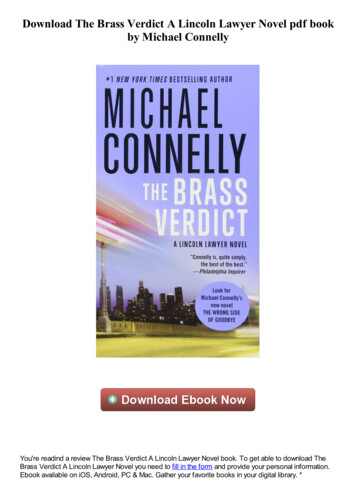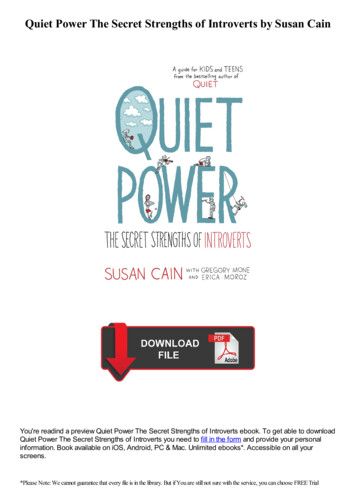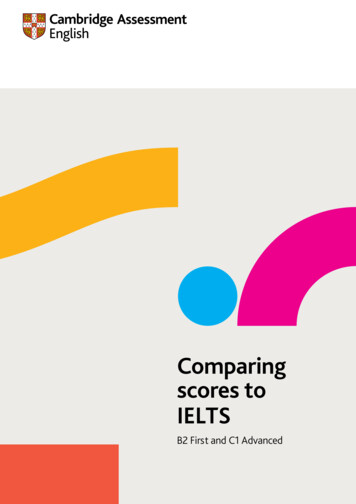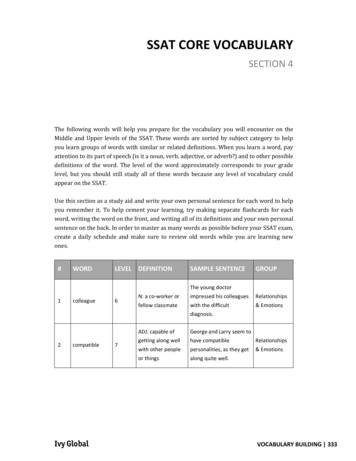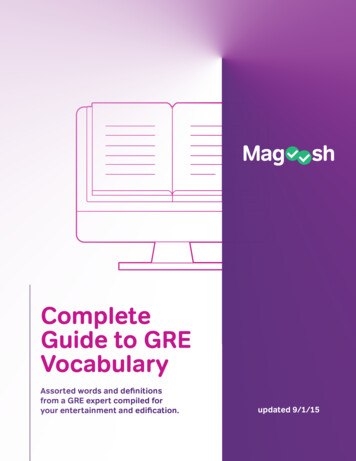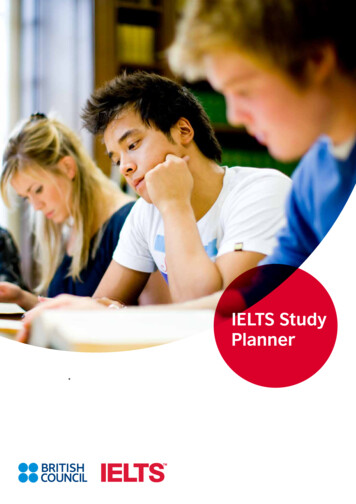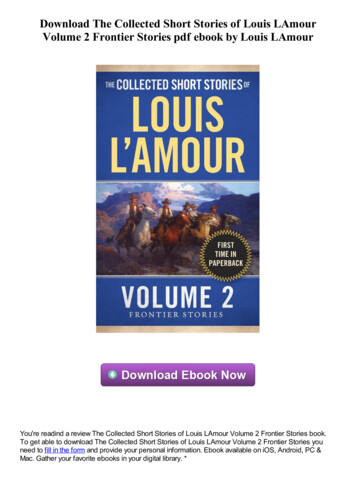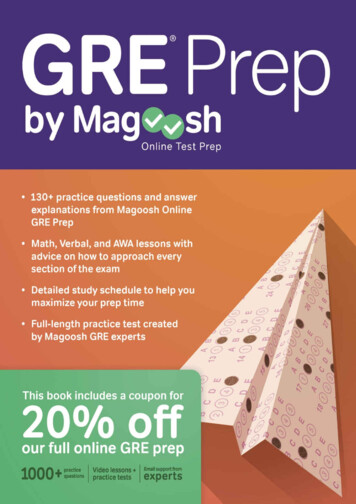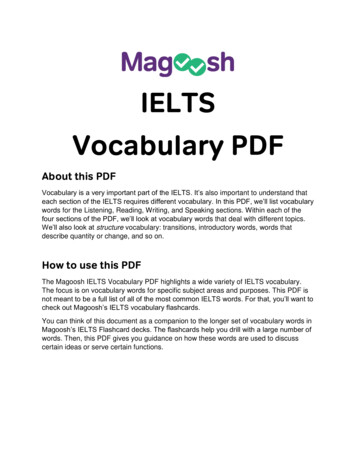
Transcription
IELTSVocabulary PDFAbout this PDFVocabulary is a very important part of the IELTS. It’s also important to understand thateach section of the IELTS requires different vocabulary. In this PDF, we’ll list vocabularywords for the Listening, Reading, Writing, and Speaking sections. Within each of thefour sections of the PDF, we’ll look at vocabulary words that deal with different topics.We’ll also look at structure vocabulary: transitions, introductory words, words thatdescribe quantity or change, and so on.How to use this PDFThe Magoosh IELTS Vocabulary PDF highlights a wide variety of IELTS vocabulary.The focus is on vocabulary words for specific subject areas and purposes. This PDF isnot meant to be a full list of all of the most common IELTS words. For that, you’ll want tocheck out Magoosh’s IELTS vocabulary flashcards.You can think of this document as a companion to the longer set of vocabulary words inMagoosh’s IELTS Flashcard decks. The flashcards help you drill with a large number ofwords. Then, this PDF gives you guidance on how these words are used to discusscertain ideas or serve certain functions.
1TABLE OF CONTENTSIELTS Listening Vocabulary WorkTravel and PlacesFamilySchool Life2356IELTS Reading Vocabulary Vocabulary in Context Strategies10The Academic Word List11Special Focus: Environment and Life Science Words 12IELTS Writing Vocabulary General Training Task 1Academic Task 1Academic Task 2151517IELTS Speaking Vocabulary Giving and Getting informationCommon QuestionsTransitions for IELTS SpeakingVocabulary for Common Speaking TopicsAbout the Authorsielts.magoosh.com2123242636
2IELTS ListeningIELTS Listening deals with a variety of subjects. But IELTS listening topics all have onething in common: they involve conversational English vocabulary.In fact, most IELTS listening audio tracks are conversations. But even IELTS Listeningspeeches have some conversational language; they’re spoken as if they’re being givento a live audience.Perhaps the most common topics in IELTS Listening are work, travel, family, and schoollife. Below is some common vocabulary within these topics.WorkWork is a common topic in IELTS listening. Here are a few useful work-relatedvocabulary words: career“Career” is a more board term than “occupation.” It refers to the category of worksomeone does, and suggests a long-term commitment. To help you understandthe difference between occupation and career, I will tell you about my career andthe occupations I’ve had in it. I have a career as an educator. My currentoccupation in this career is a Test Expert position here at Magoosh. As a parttime occupation, I am also a language tutor. And earlier in my education career, Iwas occupied (the verb form of occupation) as a middle school teacher, and thenas a university professor. shift work“Shift work” refers to work that is scheduled with a specific beginning and endingtime. A shift at a workplace often lasts 8 hours, but can be shorter. Shift work isusually paid on an hourly basis. salary workSalary work may have an expected schedule, a shift where the worker willnormally be at work. But the schedule and hours per day for salary work are notas strictly controlled. A salary worker may have to work much longer hours thanusual on a given day, or come in on the weekends. Sometimes, however, asalary worker’s situation is the opposite. A salary worker may also work shorterhours and have more freedom to leave the workplace during their normallyscheduled shifts. Salary workers aren’t paid by the hour and instead receive afixed rate of pay per week or month.ielts.magoosh.com
3 unskilled/skilledUnskilled work is work that requires little or no training, such as fry cook work at afast food restaurant, or work cleaning and maintaining buildings. Skilled workdoes require training. Some workers are so highly skilled that they have doctoraldegrees — lawyers and doctors for examples. Other skilled occupations requireless training. Skilled work as a plumber, computer programmer, or automotiverepairman may only require a four-year degree, a two-year degree, or an evenshorter certification. manual labour“Manual labour” refers to work that is very physical, requiring a lot of strength andphysical activity. Manual labour jobs include unskilled work such as stockingshelves at a grocery store, and skilled work such as welding.Travel and PlacesTravel and locations are commonly discussed in IELTS Listening conversations, and insome IELTS Listening solo speeches. accommodationOn the IELTS, “accommodation” has two meanings. It can mean the place whereyou live. This use is especially likely to come up in IELTS Speaking, where youmay be asked to describe the accommodation you live in. In travel conversations,often heard on IELTS Speaking audio tracks, “accommodation” refers to theplaces people stay while they are travelling, places such as hotels, inns, andhostels. transport“Transport” refers to the way that people move from one place to another if theyaren’t walking. In IELTS conversations, there will be talk about long distancetransport, such as trains and airplanes taken to holiday destinations. There willalso be discussion of transport within a town or neighbourhood, such as the useof a car, bicycle, scooter, or bus to get to work, school, or the supermarket. city centreThe city centre is the business district found in the middle of a city. Sometimesthis centre is also referred to as “downtown.”ielts.magoosh.com
4 main squareThe “main square” is the small, most central area of a city centre, or of abusiness district outside of the city centre. Examples of famous main squaresaround the world include Times Square in New York City and Tiananmen Squarein Beijing. attractionsIn IELTS conversations about travel and places, “attractions” refers to touristattractions, interesting places that travelers like to visit. high riseA “high rise” is a very tall building, often seen in a city centre. High rise buildingsare especially common in and around the main square of a city centre. storeyA “storey” is a single level of a building, and is also sometimes called a “floor.” Ahigh rise building generally has more than 10 storeys, and may have dozens ofstoreys, more than a hundred storeys in extreme cases. In IELTS conversations,people also may talk about the number of storeys in their personalaccommodation, with phrases such as “two storey home” or “a flat in a 12 storeybuilding.” traditional/quaintThe words “traditional” and “quaint” are both used on the IELTS to describetowns, neighbourhoods, houses, and other locations that look “old fashioned.” Aplace is traditional or quaint if its characteristics are associated with a past timeperiod. characterA home, community, town, or location is said to have “character” if it is aninteresting place that is different from other places. This word has a positiveconnotation — a positive feeling or sense. If a place has character, it is special inan enjoyable way.ielts.magoosh.com
5FamilyEnglish has a variety of words for different kinds of family members. You’ll need to hearand recognize a whole bunch of different English family words in IELTS Listening.Immediate family spousea husband or wife siblinga brother or sister sibling rivalrya feeling of competition between siblings (This is a possible topic not just inListening, but also in the IELTS Speaking Interview, and possibly in IELTSWriting Task 2.)Extended family auntthe sister of your father or mother unclethe brother of your father or mother cousinthe son or daughter of your aunt or uncle niecethe daughter of your brother or sister nephewthe son of your brother or sisterielts.magoosh.com
6 in-laws“In-law” is used to describe the relatives of your husband or wife — that is, therelatives of your spouse. Your spouse’s brother is your brother-in-law, yourspouse’s sister is your sister-in-law, your spouse’s mother is your mother-in-law,your spouse’s father is your father-in-law, and so on.Less common family wordsThe family terms below are unlikely to come up in IELTS Listening tracks. Still, there isat least some chance you’ll hear this vocabulary on the exam. Study this short list ofnot-so-common English family words, and you’ll be ready for them if they come up onthe test. stepJust as “in-laws” are your relatives by current marriage, your “step” relatives arerelatives from previous marriages. For example, if a man marries a woman whoalready has children, he becomes their step father, and they become his stepchildren. And if both a husband and wife have children from their previousmarriages, those children become each others’ step siblings. great grandparents (great grandmother and great grandfather)the parents of your grandparents great grandchildrenthe children of your grandchildrenSchool LifeAs I mentioned before, school life vocabulary is pretty common in IELTS Listening.School-related words on the IELTS are usually related to university life, rather than lifein elementary school, middle school, or finishing college. For a roundup of commonhigher education vocabulary from the IELTS Listening Section, read on! counsellorWhen students have problems or feel stress, they can meet with a counsellor. Atuniversity, counsellors provide advice and assistance to students. They helpstudents with challenges in school and in their personal lives. As the term is usedon the IELTS, a university counsellor is both an academic adviser and apsychological therapist.ielts.magoosh.com
7 administratorAn administrator is a person on campus who manages a department or aprogramme. In IELTS listening, you may hear a speaker identify themselves as auniversity administrator. Or you may read a short passage discussing the role ofa specific administrator in a university programme. office hoursUniversity staff members may have office hours. These are scheduled when afaculty member is able to see students. For example, a professor might keepoffice hours on Tuesdays and Thursdays from noon to 2p.m. During thosescheduled two-hour time periods, students could come see the professor, even ifthey didn’t have an appointment. centreA centre is a physical place on a campus where specific university tasks andactivities happen. For instance, a university might have a plant biology researchcentre. In such a centre, the biology of plants is studied and researched. Andsome universities also have a counselling centre, a specific location on campuswhere students can see counsellors. A centre can be an entire building (as manyresearch centres are), or it can be a room or office complex within a building (asis common for university counselling centres). serviceAt a university, a service is a kind of help that is available to students and otherson campus. One service that’s often mentioned on the IELTS is informationtechnology (IT) services. “IT services” refers to help and support for users ofcomputers and computer programs. Other common campus services that may bementioned on the IELTS include dining services and yes–counselling services.(The IELTS really does love to talk about counselling and counsellors.) instituteWhen you hear or read the word "institute" on the IELTS, it will almost alwaysrefer to an entire university. “Institute” is another word for university or campus onthe exam.ielts.magoosh.com
8 courseThis is one of the most common words on the IELTS. This may seem like a verysimple vocabulary word. But many IELTS test-takers get confused. It’s easy toforget that this word can have two meanings. A “course” can be a single classthat a student enrolls in, such as a one-semester history course. However, on theIELTS, a course can sometimes also refer to an entire degree. A bachelor’sdegree can be called a four-year course, and a master’s or doctorate may bedescribed as a postgraduate course.Note that in North American English, a course is almost always just one class.But of course, the IELTS is a U.K.-based exam. Test-takers who are less familiarwith British English should be careful when they see this vocabulary word on theIELTS. moduleA “module” is a section of a larger set of learning activities. On the IELTS,module usually refers to a unit within an individual semester course. A modulewill always have a specific focus. A general psychology class might have onemodule on developmental psychology, another module on abnormal psychology,and so on. workshopA “workshop” is a special group activity. In a workshop, students complete aspecial project or develop a special skill. A workshop can be part of a semestercourse. However, on the IELTS, workshop usually refers to a learning activitythat is not part of a regular university class. Instead, workshop will often refer to alearning activity hosted by a counselling centre or an academic conference. tutorialOn the IELTS, a “tutorial” refers to a single between a teacher and one or morestudents. A tutorial could be a single lesson on the use of symbolism in a famousnovel. Or a tutorial could teach students on how to use a certain computerprogram. You get the idea. A tutorial could be one session in a semester course,a one-on-one meeting with a tutor, or a learning activity that is directed by astudent club or university support centre.Here again, we see an IELTS vocabulary word that is different in British andNorth American English. In American contexts, “tutorial” is more likely to mean aninstructional video or booklet.ielts.magoosh.com
9 sitLike “course,” sit is a very simple word with an unexpected meaning. When theIELTS talks about university learning, to sit is to complete a course or exam. Ifsomeone fails a course or exam, the IELTS might say that they need to “resit” thecourse or exam.ielts.magoosh.com
10IELTS ReadingThe IELTS Reading section features the most advanced vocabulary on the test. You’llsee a lot of unfamiliar, highly specialized vocabulary for different academic subjects.You may wonder, “How can I know all of these words?” The good news is that you don’thave to know all of the advanced academic vocabulary you see on IELTS Reading.Allow me to explain.Vocabulary-in-Context Strategies for IELTS ReadingKnowing high-level vocabulary certainly helps you in IELTS Reading. But IELTSReading isn’t just a test of your English vocabulary. It also tests your ability to readpassages strategically. To successfully navigate IELTS Reading vocabulary, you needto make educated guesses at the meanings of new, unfamiliar words. You also need tobe able to guess that the meaning of challenging sentences, paragraphs, andpassages, even when you don’t understand all the words.No matter how many IELTS vocabulary words you study, you will come across wordsyou don’t know on the IELTS, especially in the IELTS Reading section. Below are somestrategies you can use when that happens.Looking at the word formPrefixes appear at the beginning of words and can help you guess a word’s meaning.Take for example, the IELTS Reading vocabulary word “understory.” The prefix “under”can be used on its own as a preposition, so this word may describe the position ofsomething.Suffixes hint at both the meaning of a word and its part of speech. Take the IELTSReading word “geology.” The suffix “-ology” appears at the end of nouns, describing anacademic study or discipline. This word is probably the name of a science.Looking at contextPrefixes and suffixes are useful, but sometimes misleading. Look at “understory” again.“Under” does look like a preposition. However, this prefix can also mean “hidden” (as in“underworld”) or “insufficiently” (as in “underfunded”). Which meaning does “under”have? Suppose that the IELTS Reading paragraph with the word “understory” dealsielts.magoosh.com
11about things found on the ground. In that case, you can know that the meaning probablyis prepositional. Similarly, the suffix “-ate” in the word “tolerate” can be used at the endof nouns, verbs, or adjectives. Again, context is key. In the IELTS Reading phrase“deep sea bacteria can tolerate very high or low temperatures,” “tolerate” appearsbetween a subject (deep sea bacteria) and an object (temperatures). You can guessthat the word “tolerate” is a verb.Context can help you understand unfamiliar root words too. You may encounter anIELTS Reading sentence with the word “geology,” and notice that the sentence talksabout rocks and stones. Through context, you’d be able to guess that “geo” refers tostone. You already know that “-ology” means a field of study. Combine the likelymeaning of the root word with the suffix, and you have learned a new word throughcontext. “Geology” means the study of rocks!Ignoring the wordIf you are still feeling “blocked” after checking prefixes, suffixes, and context, you mayneed to simply “go around” a word, ignoring it while proceeding with the rest of thepassage. To practice this strategy, read IELTS passages and other English academicwriting. As you read, cross out or delete words that seem like they may not benecessary. Then reread the passage without those words. If the meaning has changed,put a few words back in, to make sure the meaning stays the same as the original.This kind of practice helps you tell the difference between important and unimportantwords. Unimportant words on the IELTS can be ignored easily. More important wordscan still be ignored too, if you carefully watch for other word forms, grammar, andcontext.The Academic Word ListSo you don’t necessarily need to know every specialized word for every academicdiscipline. But what about academic words that appear in many different IELTS Readingpassages, regardless of topic?It certainly can be useful to study academic words that appear across many differentsubjects. And there is a word list for that. It’s called the Academic Word List. If you lookup this list on Google (or another search engine of your choice), you’ll find manydifferent wordlists and activities taken form the original Academic Word List.ielts.magoosh.com
12The original Academic Word List is huge, with nearly 600 root words, and thousands ofwords total. Here is a good overview of the AWL. And don’t worry—you don’t need tomemorize every word on the list in order to score high in IELTS Reading. Just study thelist to get a feel for the kinds of words you’re most likely to see in IELTS Readingpassages. (It’s also worth noting that Magoosh’s IELTS Vocabulary Flashcards containmany words from the AWL.)Special Focus: Environment and Life ScienceVocabularyNow, I did tell you that you don’t need to memorize all of the specialized words thatyou’ll see in IELTS Reading. However, it is still helpful to look at a few common wordsfrom the most common topics in IELTS Reading passages.I’m talking about the environment and life sciences. The IELTS loves these two closelyrelated topics. Below are some environment/life science words you are likely to seesomewhere in the Reading section. environmentYou probably already have a general idea of what “environment” means. If youdon’t, the title of this post may be a little confusing. To be clear, “environment”refers to all the physical parts of the natural world. By this, I mean the world thatis not deliberately created by humans. The environment is the air we breathe, thewater found in nature, and the land where wild animals and plants grow. In thelife sciences, the man-made parts of the world are studied carefully to see howthey affect the environment. pollution“Pollution” describes things from the human world that enter the environment andharm it. Pollution includes smoke form cars and factories, garbage that isdumped into the forests or oceans, oil spills, that sort of thing. Many differentIELTS Reading passages will mention pollution, even if the articles don’t focus onlife sciences. erosionSometimes dirt or sand get removed from the surface of the earth by wind orwater. This removal of dirt and sand is called “erosion.” Erosion can change theenvironment. If dirt washes or blows away, plants will die off, and theenvironment will change. Human activities can often cause erosion. Humans canalso work to prevent erosion.ielts.magoosh.com
13 habitatA habitat can be seen as a small part of the environment. Habitats are specificplaces where certain plants, animals, or other living things are found. A fish’shabitat is water. Some kinds of fish have a seawater habitat, while others have afresh water habitat. Cacti live in dry desert habitats. Each living thing has its ownspecial habitat. Life science texts on the IELTS look at the way that pollution canchange or threaten habitats. agricultureAgriculture is a formal academic word for “farming.” Agriculture describes theproduction of anything that can come from a farm: fruit, vegetables, meat, milk,and the like. On the IELTS, agriculture is nearly always discussed in terms ofhow it affects the environment. sustainableIELTS passages will talk about whether or not a human activity is “sustainable.”A sustainable activity is one that will not damage the environment, and will notuse up all of a resource. The use of oil as fuel is criticized as unsustainable;eventually we will use up all the oil stored in the earth. Moreover, drilling for oiland burning oil for energy both hurt the environment. emissions“Emissions” refers to any kind of gas, smoke, or air that is released into theenvironment. IELTS passages sometimes look at emissions created by humanactivity, such as smoke emissions from cars and trucks, or the emission ofcarbon dioxide (a gas that causes climate change). flora and fauna“Flora and fauna” means “plants and animals.” Flora referring to plants, andfauna refers to animals. Think of a flower and a fawn (a baby deer). These twowords will always go together in the fixed phrase “flora and fauna.” The wordsare not truly English. Instead, these words are borrowed from Latin. Thisconfuses many test-takers. Now that you know this phrase, you don’t have to beconfused when you see it on the IELTS. mammalMammals are animals that have fur (or hair) and have warm blood. Femalemammals make milk that they feed to their babies. Mammals include dogs, cats,humans, etc. Most–but not all–mammals give live birth. There are a few egglaying mammals in existence too.ielts.magoosh.com
14 reptilesWhile mammals are warm-blooded (able to regulate their own bodytemperature), reptiles are cold-blooded. This means that the temperature of areptile’s body is strongly influenced by the air temperature immediately outside ofthe reptile’s body. The reptile group of animals also have scales and no hair orfur. Common reptiles include turtles, lizards, and snakes. speciesA species is a very specific type of living thing. Mammals and reptiles are not inthe same species because these are large categories of very different animals.Dogs and turtles aren’t in the same species either because there is still a lot ofvariation between these types of animals. For a type of animal to qualify as aspecies, it must be able to mate with other animals of its kind and produce babiesthat are the same kind of animal. Humans are a species, and so are–forinstance–individual types of snakes or dogs, such as the timberwolf or the coralsnake. There are plant species too, like the Giant Redwood tree, or the tiger lily.These plants can cross pollinate and reproduce with each other, but not withother species of plants. evolve“Evolve” is a life science verb. To evolve is to change in some way in order tosurvive. Individual species of animals and plants evolve over long periods oftime–millions of years. The way the human brain has slowly gotten bigger overthousands of generations is an example of a way that humans have evolved.With a larger brain comes higher intelligence and a better ability to survive. cellA cell is a tiny living thing, so small it can only be seen with a microscope. Everycell has a thin skin that protects it, called a membrane. The membrane can takein food for the cell. Each cell is controlled by a nucleus, a kind of tiny simple brainin the middle of a cell. Cells can be part of a larger living thing. Every part of ananimal or plant’s body is made up of tiny cells. A cell can also be an independentliving thing. An ameba is an example of an organism (living thing) that has justone cell. soilSoil is sometimes called “dirt” in informal English. Soil is the dark, dirty stuffunder our feet that plants grow out of. Worms, rabbits, and other hole-digginganimals stay in or under the soil.ielts.magoosh.com
15IELTS WritingThe IELTS Writing Section has two tasks.IELTS General Training and IELTS Academic have two different versions of Task 1.The first General Training Writing Task requires test-takers to write a letter, email,memo, or other short piece of business communication. IELTS Academic Writing Task 1is an essay that describes the information found in a detailed chart, table, or graph.IELTS Academic Writing Task 2 is the same on both versions of the exam. In IELTSAcademic and IELTS General training, the second writing task is a personal opinionessay about a social issue.IELTS General Training Task 1 VocabularyFor IELTS General Training, the vocabulary is pretty much the same as theconversational vocabulary I showed you for IELTS Listening, earlier in this PDF.Basically, you create a short written piece of a conversation: an email to a co-worker, aletter to a friend, instructions for a colleague, and so on.For IELTS Academic Writing Task 1 and IELTS Writing Task 2, there are a number ofspecialized vocabulary words that you should know and use.IELTS Academic Writing Task 1 VocabularyIn IELTS Academic Writing Task 1, you should use “reporting verbs” when you describethe graph, chart or table for the task. True to their name, reporting verbs help you reportinformation that has been given.Reporting verbs are introductory phrases in IELTS Writing Task 1; they introduce newpieces of information that you take from the task’s infographic.Introductory Verbs for IELTS Academic Writing Task 1 The table illustrates the trends in The chart reveals information about the changes in The bar graph provides the differences between The line graph presents how X has changed over a period of According to the pie chart ielts.magoosh.com
16 The graphic clearly shows that As the chart indicates The table reveals that Adverbs for the First IELTS Academic EssayYou will also need to use adverbs in this first essay for Academic IELTS. In this essay,adverbs help express a relation of place, time, circumstance, manner, cause, anddegree, and can greatly add some color and interest to your writing as well as show offyour range of vocabulary. Some great ones to use in the IELTS writing include: yslightlyslowlysteadilyIELTS Academic Writing Task 1: Using Synonyms for VarietyAgain using a variety of nouns and verbs for words like rise and fall will help increaseyour overall score. Look at the next page for some suggestions:ielts.magoosh.com
17Vocabulary for IELTS Writing Task 2For the second IELTS Writing Task, the important vocabulary is all about transitions.The most common purpose of Writing Task 2 transitions is to: give opinionsadd new informationcompare and contrast ideasmake conditional statementsgive examplesdescribe resultsHere is a list of some useful vocabulary words for each of these six transition types:ielts.magoosh.com
18ielts.magoosh.com
19ielts.magoosh.com
20ielts.magoosh.com
21IELTS SpeakingIn the IELTS Speaking interview, you’ll deal with two main types of vocabulary. TheSpeaking Section requires you to hear and say a lot of “function” words that people usewhen they are asking for information or giving information. It’s also helpful to know a lotof words related to the IELTS Speaking topics.Below, we’ll look at Speaking vocabulary for exchanging information and makingtransitions, followed by a few common IELTS Speaking questions, with key vocabularywords highlighted. After that, I’ll give you a list of vocabulary words related to specificcommon IELTS Speaking topics.IELTS Speaking Vocabulary: Exchanging InformationAsking for Information Describe “Describe” will appear at the beginning of many IELTS Speaking topic cards. Beready for requests for information such as “Describe the house you grew up in,”or “Describe your closest friend.” Would you say that ?“Would you say that ” is a common phrase in follow-up questions to the initialIELTS topic card enquiry. For the “describe a place you live” question, forinstance, the follow-up could be “Would you say it’s a nice place to live?” Could you explain more ?This is another follow-up question phrase to listen for. Your IELTS interviewer willuse this phrase when he or she wants more detailed information on somethingyou just said. For example, if you tell an IELTS interviewer that your best friend isalways very helpful, they might ask “Could you explain more about how your bestfriend helps you?”ielts.magoosh.com
22 Can you tell me ?This is an alternate way to start an IELTS question, rather than starting it with awh-word or “describe.” To give a couple of examples, “”What is your name?” canbe rephrased as “Can you tell me your name?” and “Describe your family” couldalso be asked as “Can you tell me about your family?” I need to know This form of questioning can be easy to miss because it sounds like a statementrather than a question or request. “I need to know” is commonly heard in IELTSListening. The phrase is often said by a person who has contacted a company orteacher to get information about something.Confirming You’ve Gotten Information I got it.This sentence is used when a listener wants to confirm that they understand theinformation they’ve just heard. You can use this phrase in IELTS Speaking to tellyour interviewer that you understand the instructions they’ve given you. We’ve been talking about
The Magoosh IELTS Vocabulary PDF highlights a wide variety of IELTS vocabulary. The focus is on vocabulary words for specific subject areas and purposes. This PDF is not meant to be a full list of all

